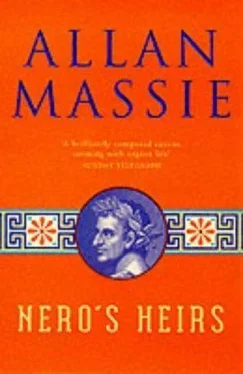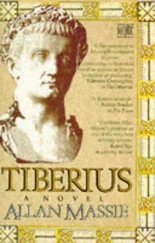Allan Massie - Nero_s Heirs
Здесь есть возможность читать онлайн «Allan Massie - Nero_s Heirs» весь текст электронной книги совершенно бесплатно (целиком полную версию без сокращений). В некоторых случаях можно слушать аудио, скачать через торрент в формате fb2 и присутствует краткое содержание. Жанр: Исторические приключения, на английском языке. Описание произведения, (предисловие) а так же отзывы посетителей доступны на портале библиотеки ЛибКат.
- Название:Nero_s Heirs
- Автор:
- Жанр:
- Год:неизвестен
- ISBN:нет данных
- Рейтинг книги:3 / 5. Голосов: 1
-
Избранное:Добавить в избранное
- Отзывы:
-
Ваша оценка:
- 60
- 1
- 2
- 3
- 4
- 5
Nero_s Heirs: краткое содержание, описание и аннотация
Предлагаем к чтению аннотацию, описание, краткое содержание или предисловие (зависит от того, что написал сам автор книги «Nero_s Heirs»). Если вы не нашли необходимую информацию о книге — напишите в комментариях, мы постараемся отыскать её.
Nero_s Heirs — читать онлайн бесплатно полную книгу (весь текст) целиком
Ниже представлен текст книги, разбитый по страницам. Система сохранения места последней прочитанной страницы, позволяет с удобством читать онлайн бесплатно книгу «Nero_s Heirs», без необходимости каждый раз заново искать на чём Вы остановились. Поставьте закладку, и сможете в любой момент перейти на страницу, на которой закончили чтение.
Интервал:
Закладка:
Then there is at least one element in my relations with Domitian which I cannot decide whether I dare recount. That it is germane is certain. But the incident doing me so little credit is one which I am loth to unfold. More of it in this notebook, perhaps, subsequently. It relates to Domatilla, sister of Titus and Domitian, a year younger than the latter. If I was even to drop her name in this context into my narrative, Tacitus would quiver like a hunting-dog that has scented game. Why is it that puritans like Tacitus, and indeed Domitian too, are so excited by a whiff of sexual scandal, and take so prurient and inquisitive an interest in the sexual activities of others, especially when they are what is termed 'deviant'? In Tacitus' case, doubtless because he has enjoyed so little sex himself. Domitian too perhaps? He talked much of 'bed-wrestling'; how much was wishful talk I never knew. Tacitus can't believe that Domitian was a puritan like himself. But then, my friend, though a master of language, is deficient in the knowledge of men; he has no understanding of what Greeks call psychology.
I have so little now to occupy me it is no wonder that, gazing on this sullen wind-whipped sea, past scenes move in the stage-set of my memory. Obedient to Titus, I now began to frequent the new baths on the Campus Martius, which were given the name of Nero's, though everyone knew that they had actually been commissioned by his minister Burrus, since murdered by imperial command. I went there at the hour favoured by young nobles, among whom I belonged by birth if not fortune. Naturally, it wasn't long before I attracted attention.
(It amused me by the way to remind Tacitus in my last letter of my youthful beauty. He looked like a scraggy crowling himself.)
Among my admirers was the poet Lucan. He approached me one afternoon as I reclined on a bench in the palaestra after my bath, and at once launched himself into a long speech of which I cannot remember a word, though he was certainly voluble. But his eyes were more eloquent still. It was clear that he had concluded from my attitude that I was in search of an admirer. 'You're a dancer, aren't you?' he said. 'I've seen you at the theatre…'
I allowed him to continue some time in this fancy, neither confirming nor denying his words, and favouring him with a smile that was friendly rather than inviting.
At last, when he had exhausted his store of flattery – for the time being only, since I have rarely known anyone with such a flow of words – and had made it quite clear what he wanted of me, I told him my name, and was rewarded, as I had expected, with a flush of embarrassment. To mistake a Claudian for a professional catamite was, at least in those days, a social blunder of the first order.
But Lucan was resourceful. He collected himself quickly, changing his words, though still singing them to the same tune. I was impressed. Only the thought of Titus prevented me from responding with the ardour my new friend so clearly sought.
I parried his attack, knowing that nothing is so desirable as a boy who protects his virtue and yet shows no sign of being offended by attempts to undermine it.
Lucan, accustomed, on account of good looks, self-confidence and literary reputation, to easy conquests, was enthralled by my resistance and redoubled his efforts to seduce me.
Discovering that his physical charms were not sufficient for his purpose, and that not even his sublime eloquence could persuade me to share his bed, he rashly sought to win me over by admitting me to his secret world in order to excite me by making me aware of his importance. So he dropped hints that he was engaged in a great and dangerous enterprise. I smiled and said he would be wiser to tell me nothing of it. I was only a boy, I reminded him, and had no concern with such matters. Wouldn't it be better if he recited to me some more of the great poem he was writing? I would appreciate that more; literature, I said, fluttering my eyelashes, was more interesting to me than politics. Besides, politics belonged to the Republic which he invoked so marvellously in his verse. There could be no politics now that we lived under the despotism of Empire.
My indifference spurred him on to ever greater imprudence. I might flatter him as a poet. That was not what he wanted. Or rather it was not enough for him. I daresay, if I had yielded, I would not have been enough either. He was, I see now, a man of that unhappy sort whose every success serves to sharpen their innate dissatisfaction. Such types are more common than you might suppose. I should know. It is, or was, my type also.
Lucan was eaten up with pride of birth. Yet he was actually more notable for the eminence of recent connections, such as his uncle Seneca, than for his more distant ancestors. He was after all, Spanish by birth, not a true Roman at all, a descendant of some younger son who had established himself in Spain – Cordoba, I believe – seeking in the provinces what was denied him in Rome. Perhaps it was simply because Lucan was what I then thought of, scornfully, as a colonial, that he was so eager to impress on me his sense of the greatness of his family. I smiled, and removed his hand from my thigh.
'But,' I said, 'your poetry will make you immortal. In that case what do your ancestors matter?'
He didn't care for that response, which indicates that he was not a true poet perhaps, since almost every poet I have known – and in my time I have been plagued with whole tribes of the creatures -has thrilled at the thought of immortality, and been ready to swear that the taste of future generations must be markedly superior to that of today.
But Lucan, lacking self-knowledge, saw himself as a great aristocrat, who threw off poetry with a negligent ease. It was something he did with style, but it didn't matter to him, except in as much as he acquired repute by his verses. He did not – perhaps it is needless to say – seek to impress other poets and critics, for he despised with some justice what he called 'literary sewing-circles'. The audience he aimed at was composed of the politically restless and dissatisfied, great ladies, beautiful women, and at least one very pretty boy.
When he realised that I was prepared to admire his verses and yet not yield to his advances, he was seized with rashness. The hints he had already dropped concerning his engagement in a matter of great moment were now amplified. He was, he told me flatly, one of a conspiracy against the Emperor. Indeed he was one of its most ardent spirits. What did I think of that? 'I think you are unwise to tell me,' I said.
'I tell you,' he replied, 'to demonstrate that my love is such that I am ready to put my life in your hands.'
'Your life, and the life of others,' I replied. Yet, despite everything, I would not yield. His eyes, I have remembered, were small and too closely pressing on his nose.
I was however sufficiently touched by the candour he had displayed to me, even though I was in no doubt as to the motive, to draw on my conversation with Titus in order to convey some sort of warning to my admirer.
So I asked him what measures he and his friends had taken to secure the support of the legions.
'The army,' he said, 'will be obedient to the Republic which will speak through the Senate.' Then, young though I was, I knew that he was lost in silly dreams.
Naturally I reported our conversations to Titus, employing, as I had promised, the cipher he had taught me. Lucan was not, as I learned much later, central to the conspiracy. His suggestion to me that he was proved to be only another example of that vanity characteristic of literary men. The head of the conspiracy was a man of much higher birth, G. Calpurnius Piso. (He had a nephew whom I often saw with Lucan at the baths; perhaps it was through him that Lucan became involved.) Even Piso may only have been the nominal head. He certainly wasn't cut out for that sort of thing. For instance, when it was proposed that Nero should be invited to Piso's villa near Velletri and murdered there, after a banquet, Piso vetoed the plan. He said that to stain his hospitality in this manner would create a bad impression. Even Lucan, with his absurd admiration for that 'Republican virtue', belonging to an age which had vanished, found this ridiculous.
Читать дальшеИнтервал:
Закладка:
Похожие книги на «Nero_s Heirs»
Представляем Вашему вниманию похожие книги на «Nero_s Heirs» списком для выбора. Мы отобрали схожую по названию и смыслу литературу в надежде предоставить читателям больше вариантов отыскать новые, интересные, ещё непрочитанные произведения.
Обсуждение, отзывы о книге «Nero_s Heirs» и просто собственные мнения читателей. Оставьте ваши комментарии, напишите, что Вы думаете о произведении, его смысле или главных героях. Укажите что конкретно понравилось, а что нет, и почему Вы так считаете.












